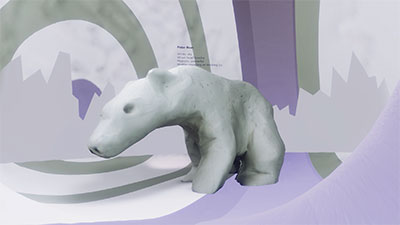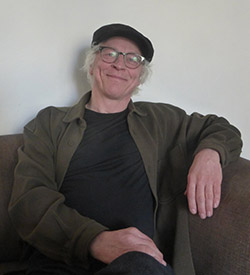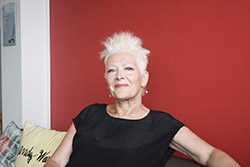Monday, 01 November 2021
The vital work of the University of Nottingham-based Frozen Ark is being brought to life in a new creative project by an award-winning artist and a children’s author.
The Frozen Ark is a charitable ‘frozen zoo’ project based in the University’s School of Life Sciences. Its mission is to preserve the DNA and living cells of thousands of endangered species to retain the genetic knowledge for the future.
The Virtual Ark project has been launched to coincide with COP26. It aims to raise awareness of the extraordinarily biodiverse heritage of the planet and the plight of animals and wildlife threatened with extinction. It asks the questions:
- What would a virtual ark look like?
- Out of more than 15 thousand vulnerable species which ones would you save?
- How can we safeguard the future of these amazing creatures?
- And, just what is a ‘biobank?’


Throughout the lockdown of 2021, award-winning artist Paul Evans worked with writer/illustrator Rowena Sommerville, The Frozen Ark biobank, creative social enterprise Our Big Picture and Tees Valley Arts to deliver a series of online creative workshops in schools and communities throughout the North of England and Wales.
During these workshops participants co-created a virtual 'gene bank' for endangered species by drawing, making models and writing poetry. Human VR has developed these into the immersive 360-degree digital artwork that brings the creations to virtual life online.
 Paul Evans, Artist ©Paul Evans
Paul Evans, Artist ©Paul Evans
Artist Paul Evans said: “I have a lifelong enthusiasm for biology - particularly animals. I love animals as much as I love art to tell the truth. This passion was originally sparked off through reading Gerald Durrell books when I was young, and I've been transixed by David Attenborough's wildlife documentaries for decades. That's why working with the Frozen Ark team has been a dream collaboration.
“The impact of climate change has been stark with thousands of species threatened with extinction. There are many reasons for this, from rising water levels on tropical islands that will literally drown their rare and unique animal inhabitants, to melting artic sea ice that is preventing polar bears from hunting for the seals that they depend on for food. As an artist I see this, quite frankly, as a crime against beauty, a crime against millions of years of elegant, evolved complexity."
 Rowena Sommerville, Writer © Rowena Sommerville
Rowena Sommerville, Writer © Rowena Sommerville
Rowena Sommerville added: “It has been brilliant working on the Virtual Ark, and there are many ways in which artists can help to support the vital campaigns for addressing climate change and the biodiversity crisis. It is also fun to support all kinds of people, from children to environmental scientists, to express their concerns creatively.”
 Professor Michael Bruford, Director of The Frozen Ark
Professor Michael Bruford, Director of The Frozen Ark
Professor Michael Bruford, Director of the Frozen Ark, said: “The ‘Virtual Ark’ is an amazing initiative that will help get the message out to young people, who hold the key to the future of our planet and its biodiversity. Paul and Rowena’s talents offer a transformative experience, and the use of VR is tremendously exciting.”
Pete Massey from Arts Council England, who funded the work, said: “As concern for the planet and the increasing extinction of animals continues to grow, I'm really pleased that we are supporting a project that raises awareness of this issue using the arts in conjunction with science. I'm delighted that the workshops have enabled people across all our communities to get involved and consider the implications of this ecological crisis for themselves."
For more information on the project’s results and the Virtual 'Arkive' of endangered animal models, paintings, drawings and poetry visit: https://www.frozenark.org/the-virtual-ark
The Virtual Ark has been made possible thanks to public funding from Arts Council England’s National Lottery Project Grants programme.
Video showreel for Virtual Ark © Humanstudio:
Story credits
For more information, please contact Paul Evans, Virtual Ark Artist, via email pkevans1@sky.com or Emma Rayner, Media Relations Manager on 07738 291242 or emma.rayner@nottingham.ac.uk
Notes to editors:
About the University of Nottingham
Ranked 97 in the world and 17th in the UK by the QS World University Rankings, the University of Nottingham is a founding member of Russell Group of research-intensive universities. Studying at the University of Nottingham is a life-changing experience, and we pride ourselves on unlocking the potential of our students. We have a pioneering spirit, expressed in the vision of our founder Sir Jesse Boot, which has seen us lead the way in establishing campuses in China and Malaysia - part of a globally connected network of education, research and industrial engagement.
Nottingham was crowned Sports University of the Year by The Times and Sunday Times Good University Guide 2024 – the third time it has been given the honour since 2018 – and by the Daily Mail University Guide 2024.
The university is among the best universities in the UK for the strength of our research, positioned seventh for research power in the UK according to REF 2021. The birthplace of discoveries such as MRI and ibuprofen, our innovations transform lives and tackle global problems such as sustainable food supplies, ending modern slavery, developing greener transport, and reducing reliance on fossil fuels.
The university is a major employer and industry partner - locally and globally - and our graduates are the third most targeted by the UK's top employers, according to The Graduate Market in 2024 report by High Fliers Research.
We lead the Universities for Nottingham initiative, in partnership with Nottingham Trent University, a pioneering collaboration between the city’s two world-class institutions to improve levels of prosperity, opportunity, sustainability, health and wellbeing for residents in the city and region we are proud to call home.
More news…